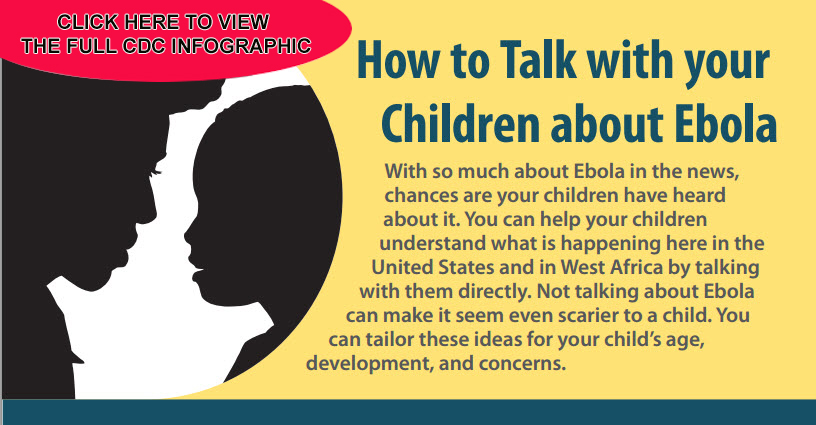Editor's Note: This page will be updated with new information as it becomes available.
In an effort to share accurate information and tips, the American Academy of Pediatrics (AAP) clarifies what Ebola is and what parents can do to protect their children.
What is Ebola?
Ebola is a viral infection, yet it is very rare and is not easy to transmit from person to person. There is a serious outbreak in West Africa, however, in part due to lack of
germ prevention and access to adequate medical supplies.
What are the Signs & Symptoms of Ebola?
Ebola typically starts suddenly with a
fever but symptoms can also include a severe
headache, fatigue, muscle pain, weakness,
diarrhea,
vomiting, stomach pain, or unexplained bleeding or bruising. The time from infection with the virus to the onset of symptoms is from 2 to 21 days
(with 8 to 10 days being most common). A person with the Ebola virus can infect others as soon as they begin to have symptoms. Early-stage Ebola disease may be confused with other infectious diseases (e.g.,
flu) because the initial symptoms are similar to those seen with other viral infections.
How is Ebola Spread?
Unlike the flu, Ebola is not spread through the air or water. The chances of you or your children becoming infected are slim. Ebola is only transmitted through direct contact with the body fluids of an infected person or from objects like needles that have been in contact with infected body fluids. This means it does not spread through air, food, water, or by touching things like money and keyboards.
See Q&A's on Ebola Transmission on CDC.gov.
Can You Get Ebola From a Dog or Cat?
At this time, there have been no reports of dogs or cats becoming sick with Ebola or being able to spread Ebola to people or animals. The chances of a dog or cat being exposed to Ebola virus in the United States is very low as they would have to come into contact with blood and body fluids of a symptomatic person sick with Ebola.
See Q&A's about Ebola and Pets on CDC.gov.
Can Ebola Be Prevented?
Yes, killing the virus is easy. The Ebola virus can be killed with soap and water, heat, or a disinfectant or sanitizing agent.
According to the Centers for Disease Control and Prevention (CDC),
washing hands frequently is a good precaution. This is perhaps the most important message for children to learn and share.
Because people in West Africa may not be able to follow these
precautions and may not have access to soap and water, Ebola has continued to spread.
Important Message for Parents:
It is much easier to catch to the flu or
other respiratory viruses than Ebola. For example, based on the Ebola statistics we have right now, it is likely that flu will cause far more illness and deaths around the globe than Ebola will.
News Coverage
Understandably, there is
heavy coverage in the media about the spread of Ebola. However, it is a good idea to limit young children's exposure to news stories about it. This way, parents can decide what information they want to share based on their
child's level of understanding.
Here are some things to remind your children if they are concerned:
- They are safe.
- Our health care system is among the best in the world for taking care of sick people.
- Ebola is rare and does not exist everywhere. When cases are found, the person with the infection is taken to a safe place to be cared for so that he can get better and not make anyone else sick.
- Doctors and scientists who know a lot about Ebola are working hard to find ways to prevent or cure this illness.
Social Media
With many children and teens spending a lot of time on social media, there is also the risk that they could read something online about Ebola that they do not understand and may become unnecessarily alarmed. Pay close attention to what your children are seeing online.
Talk to your children and help them avoid graphic exposure to the media.
Keeping Calm
News about the spread of diseases can be alarming, even for adults. Keep yourself well informed so that
your own fears are under control. Talk with your children in ways that make sense to them so they don't become overly concerned or afraid.

Additional Information:
Additional Resources from the U.S. Department of Health and Human Services Administration for Children and Families' Office of Human Services Emergency Preparedness and Response (OHSEPR):